(This post is one in a series on race titled “But Some of Us Are Brave.” The series includes posts from a diverse group of writers from our community. It takes a considerable amount of transparency and vulnerability for the contributors to this series to pen these posts and voice their experiences. We appreciate their courage, and we hope their willingness to be brave will spark some authentic community conversation on this sensitive and important topic. We hope you will read these posts thoughtfully and join the conversation by responding honestly and respectfully, and by sharing them with your friends and acquaintances. — ABT )
Dear Fear,
Normally I start a letter by asking how you are, but I don’t much care to ask how you are doing. Instead, I’ll get right to it: you’re really wreaking havoc in our communities and I’d like to see it stopped.
You are a bully. You like to push and prod. You coax us to think the worst about people, exaggerate stereotypes. A drop in the stomach when I see that man, that black man walking toward me. Fear, you urge us on.
Fear, you are not new to this job. No, your tactics were employed long ago to strip people of their identity, their pride, and their dignity. Slavery, Jim Crow, Segregation– I smell your stench in them all.
Your tactics have evolved. Even now, people are paralyzed from speaking or sharing because of you. Their words mangled and strangled because of your tight, tight grip.
Fear, you are not an excuse or cop out. We cannot blame you for the hate and enmity that exists between peoples. But you do cause us to pull away instead of drawing near to each other, which disables us from seeing the Beloved Community realized. We are then blind to the reality and beauty of each individual and the collective.
When we give you power, we allow you to destroy whole groups of people. Fear, you are no friend of mine.
But I know your secret. I know you flee at the first flicker of unity. You shrink back at the sight of common understanding. You groan under the weight of triumphant justice. And so, it’s really clear isn’t it? We can be victorious over you.
I’m saying goodbye. I have no time for you. You’ve ravaged too long the streets of Waco, the hearts of men and women, the dreams of little brown boys and girls.
I am a fool no longer.
I am joining hands with my sisters and brothers to dispel you. It takes more than some of us to be brave, I know that well. We need everyone to be brave so that our communities can be full of beautiful color and song again. We need to be brave so we can build and rebuild bridges long burned down.
Don’t bother looking for me again, fear, because I’ll be too busy walking free, hand in hand with my beloved community, working toward justice, peace and wholeness. And frankly, you’re not invited.
Most sincerely,
Alexis
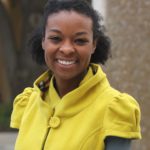 Alexis Christensen is a Community Organizer at Waco Community Development Corporation (Waco CDC).
Alexis Christensen is a Community Organizer at Waco Community Development Corporation (Waco CDC).
by Liz Ligawa
I was sitting in my doctor’s office as I awaited my time to be seen. The “things to do” from our last visit scrolled through my head, ready to spill out as soon as she walked in: Decrease sodium intake. Increase physical activity. Limit processed foods. Take time to rest. These were not unkind recommendations. In fact, this wise counsel was offered to me by one of the most generous souls in medicine I know. But I still had not done it. So, I decided to keep quiet about the list- silently hoping she would not notice. Though she kindly observed my silence, she allowed her instruments to reveal the truth.
Over the last six months or so, I have been listening for, and to our community concerning the safety of Americans of African descent in relation to police. The dialogue and inquiry which has pulsed through communities across our country seems to have found censure in Waco. Is there something different about Waco that would make these conversations unnecessary? Is Waco a unique community which is immune to the ills suffered by Ferguson, MO or New York? Why is Waco so silent?
Before I continue, let me be honest. This subject is quite difficult for me. It is not what I originally intended to write about. I even struggled with feelings of inadequacy to engage this topic. However, even as I strongly embraced the urge to keep a safe distance from this truth, I realized that although it does not appeal to my comforts, I must acknowledge its appeal to my conscience. There is much to be heard in silence.
Waco has a history about which she keeps silent. It reminds me of the invisible boundaries we all adhere to in our families. Only a couple of months ago, many of us participated in these waltzes as we navigated the hushed topics of family members during the holidays. We will not discuss David’s drinking even as we grow nervous with each subsequent glass. We do not check in on Miriam and Max’s marriage even as resignation fills their eyes. And it sure would not be polite to mention the miscarriage suffered by Destiny and Deleon; they still have little Suzy anyway…right? Silence protects our secrets.
Jesse Washington is one of Waco’s secrets. Its own history with Americans of African descent is the reason Waco remains silent.
I was listening to a brief TED talk by an educator named Clint Smith. In his discussion about silence, he takes courageous steps of vulnerability and discloses motives which took their turn in rendering him silent. Smith shared that though he had focused his passion to liberate his students, charging them to not abscond with their truth, he found himself in need of being reminded of the truth: “We spend so much time listening to the things people are saying that we rarely pay attention to the things they don’t: Silence is the residue of fear.”
I wonder how you are dealing with my silence in this article. There are many things I have left unsaid. Up until now, if you did not already know the story about Jesse Washington, there is not much more you know from reading what I have written. Up until now I have not mentioned that he was an African-American farm hand. Up until now, I have not mentioned he was held responsible for the death of an Anglo wife of a cotton farmer in 1916. Up until now, I have not mentioned our McLennan County courthouse…the hanging tree…or what was made of the charred remains of a man not valued by society; not valued by his Waco community. Our silence tells a story.
In the doctor’s office that day, my silence told a story. If Dr. Duchamp would have only attended to my smile, I would have seemed alright. If she would have only paid attention to my put-together presentation, she would have had no concern. If Dr. Duchamp received my silence as an indicator of all things well, my needs would have remained unaddressed and on course for unfortunate events. I am grateful she practiced well when the truth was hard for me to tell.
In the silence I hear in our community, I am trying to decipher what it means. There are steps which have been made with regard to this part of our history, but there are silences still needing to be attended: the silence of apology in the resolution; the silence of Mr. Washington’s name.
Yes, silence tells a story on its own. What story are you telling with yours?
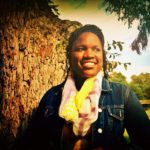 This post was written by Liz Ligawa. Liz is a graduate student of Baylor University where she has found the perfect expression of her community-centered heart in the MDiv/MSW degree program. With a concentration on Community Practice, she is also the adoring mother of one son, Elijah, who prefers to be regarded in public as Spider-Man. She may be reached at [email protected].
This post was written by Liz Ligawa. Liz is a graduate student of Baylor University where she has found the perfect expression of her community-centered heart in the MDiv/MSW degree program. With a concentration on Community Practice, she is also the adoring mother of one son, Elijah, who prefers to be regarded in public as Spider-Man. She may be reached at [email protected].
The Act Locally Waco blog publishes posts with a connection to these aspirations for Waco. If you are interested in writing for the Act Locally Waco Blog, please email [email protected] for more information.
(This post is one in a series on race titled “But Some of Us Are Brave.” The series includes posts from a diverse group of writers from our community. It takes a considerable amount of transparency and vulnerability for the contributors to this series to pen these posts and voice their experiences. We appreciate their courage, and we hope their willingness to be brave will spark some authentic community conversation on this sensitive and important topic. We hope you will read these posts thoughtfully and join the conversation by responding honestly and respectfully, and by sharing them with your friends and acquaintances. — ABT )
by Ruben Salazar
I’ve never been shot at by a cop or chased by sheets-wearing men, but I have been at the receiving end of power-toting bigots. In many ways, I’m also surrounded by an important aspect of racism—white power (known by some as just “white privilege”). People of color will be on to something positive in our city when we can find ways to dilute dominant white power structures. In my opinion, one of the best ways of doing this is by fighting for diversity (not just tokenism) wherever there are seats at the tables of power.
My friend Sonya said something interesting to me one day. She commented about how some of us go through a ‘get back at whitey’ phase. We had been chatting about the lack of racial diversity around Waco. Sonya is a black woman. I felt an immediate bond with her because we shared the same frustration with white power and privilege. By the way, neither Sonya, nor I, nor others we associate want to get back at anyone. To ‘get back at whitey’, used in the way it rolled off Sonya’s tongue, is the desire to change the white power system. (Try reading Howard Zinn’s, A People’s History of the United States, for a benign introduction to white oppression.)
Personal experiences also fuel my desire for change.
For example, I’ve been frisked a few times—for no reason—by white cops for committing minor traffic violations. A white sheriff once flipped me off for no reason when I went to visit a friend at the county jail—I was just 15. And then there was the white highway patrol officer who pulled me over for doing 62 mph on a 60 mph zone. He frisked me, then told me to get into his patrol car’s passenger seat. I asked him if this was protocol. To this, he answered with his heavy twang, “Boy, I do what I want!”
Through the years, I’ve heard white supervisors make comments about how they hate hearing Spanish spoken at work. A white manager once told me that black universities are a form of reverse racism. I’ve been told by white company leadership that Affirmative Action policies only invite unqualified black and Latino personnel who can’t do the work as well as “someone who got the job because they were properly qualified” (i.e., the white person). Two white people, just this past year, boasted to me about their racist actions: one used to shoot his BB gun at blacks walking down the street and the other used to put snakes in the jeeps of black soldiers when he was in the military. Would they admit the same in the face of a black person?
Encounters with racism and white power aren’t always so stark and in your face. For starters, there is a long list of examples of institutionalized racism. Also, there are many white people who exert white power without knowing that they’re doing so. For example, some churches and religious charitable organizations enjoy imposing their power onto non-whites and poorer whites. I used to live in an area in North Waco that is apparently ripe for “community service projects.” I’ve grown accustomed to seeing young white volunteers mow yards and clean up blighted areas for tenants who must be too poor to mow and clean. I know because my yard got mowed once, without my consent, while I was away from the house! That was the day I learned I was poor.
And get this: once, while my wife and I were cleaning our yard, a young white couple walking by stopped and asked us if we were providing “service to the homeowners”! Wow! Who knew people could take care of their own yards?
Can you think what would happen if I—a brown-skinned Mexican—moved to a white upper-class part of town, set up my charity, and began to impose changes on the neighborhood that I thought were needed?
Able-bodied people of color shoot themselves in the foot when they accept having their yards mowed or their houses painted. This acceptance just perpetuates the idea that we need their help. “Never do for someone what they can do for themselves”. Now there’s a motto that, if upheld by everyone, would tear down a large chunk of the white power structure lurking in our communities.
Our society will be a better place when blacks, Latinos, poor whites, and others perceived as needy, do for ourselves, instead of relying on the handouts and freebies from entities designed by whites with power — some of whom turn around and complain about poor peoples’ demands for entitlements. This is an argument for grassroots community organizing amongst minorities, but that’s another story.
It would also help if white (and other) insistent do-gooders could begin to view blacks, Latinos and poorer whites as having strengths and abilities, instead of having deficits and having to aspire to middle class values (e.g., the Ruby Payne framework). My suggestion is that they re-educate themselves and others with white power about how their charitable acts, funds and other support, in many ways, perpetuate the very problems they think they’re trying to eradicate.
People of color should continue the fights of our forefathers and mothers for racial equality. We should continue to demand racially diverse leadership (at all tables of power—community organizations, business, government, education, etc.) that mirrors the diversity of our communities so that we can begin to diminish the historical specter of white power and privilege.
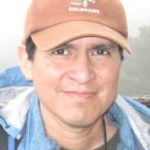 Ruben P. Salazar is a native Wacoan who enjoys learning about history and culture. He is an artist and a do-it-yourselfer around the house. In the very near future he swears he’ll finally self-publish his long overdue book about a local dude people used to call the Maracas Kid. Gardening and being crafty are two things he loves to do with his lovely wife, Rachel.
Ruben P. Salazar is a native Wacoan who enjoys learning about history and culture. He is an artist and a do-it-yourselfer around the house. In the very near future he swears he’ll finally self-publish his long overdue book about a local dude people used to call the Maracas Kid. Gardening and being crafty are two things he loves to do with his lovely wife, Rachel.
by Sophia A. Strother
I struggled with this blog for weeks not really sure what I should discuss given so much that has transpired in my personal life and nationally that has had a profound effect on me. I wondered…should I discuss the dominant news on civil injustices against black men? The national spotlight on domestic violence in the sport and entertainment industry lately? Or my personal experience recently of losing my grandmother who played such a vital role in the woman I am today? So much to talk about and only a short space to do it in…
I finally settled on the life changing experience of deciding to take my grandmother into my household. I became her sole caregiver in January 2012. Millions of people across America have made this same decision, yet there has not been much attention or appreciation regarding the silent journey of heroism that such a decision renders.
Many know my story. I survived sexual abuse at the hands of my father, rape at the age of 14 which led to motherhood for me at 15. I also survived a mother who succumbed to drugs through my adolescence and adulthood. I’ve told this story through my book “Sophia: I’m Back.”
Many also know that my grandmother, Vivienne “Mattie” Strother Adams, was my appointed angel in my life. She took me and my newborn son in when I was 15 and helped to set the foundation of the woman that I am today. It was a no brainer that when she became terminally ill with Vascular Dementia and Congestive Heart Failure I was going to be HER angel by making sure she was well taken care of. So at the height of my career I took in my grandmother, homeless mother and two younger brothers making ours a mighty household of 8….yes, I said 8 … and, I was the ripe old age of 32.
Over two years, as my grandmother’s disease progressed, I resigned from my career with the State of Texas, withdrew from the public, and became lonely and desperate for resources and support. Unfortunately, offers of support were far and few between. If I found a support group it was only held once a month. My grandmother didn’t have Medicaid, so I only received 20 minutes of aid three times a week; everything else had to be paid out of pocket. I realized in that time that caregivers are grossly overlooked. Other people underestimate the grueling emotional toll caring for your loved one has on your own psyche.
I considered myself to be strong and forward thinking, but toward the end of my grandmother’s life this past November I found myself weakened and without purpose. I’m hoping more caregivers find the strength to reach out to one another. I also hope helping organizations realize that once a month isn’t sufficient to give emotional and mental release for caregivers.
I have a new found respect and bond with others that took the same journey as I did through caregiving.
Here are some tips that worked for me:
- Take time daily to step away — Whether it was 30 minutes to sit on the porch, or time to read a book. I had to make time for myself to clear my mind from the daily chores of caregiving.
- Reach out to others when feeling down — I used to feel guilty that I was sad about giving up my career or a large portion of my social life, however, reaching out to friends, former coworkers and community colleagues really helped. They kept me laughing and talking, and allowed me to vent.
- Seek out community resources. — There are several support groups in the community and they work. You need to talk to others who can truly understand. Also you might learn tips or new ways of caring for your loved one.
- Know your limits. — I had to accept I couldn’t physically do everything and it was okay to ask for help. Take advantage of volunteers who are willing to help or low-cost agencies that can also aid.
- Know that YOU ARE A BLESSING! — Even if you don’t get a pat on the back, you are a blessing to your loved one and it’s a blessing to be able to have the heart and means to care for them. Some of our loved ones mentally start to leave us, but try to remember the good times you had with them or how they were there for you and it helps ease you during the rough nights.
Act Locally Waco, thank you for having an outlet for the community to share and connect. I hope if you are in a similar situation and you are reading this that you will realize you’re not alone. Reach out to others for help as you travel through this journey of caregiving. A piece of my soul left me on November 9th, but I wouldn’t trade my experience and journey of caring for my grandmother…all the intimate time I had with her…now that she has gone to heaven, I appreciate that I didn’t miss it. TO ALL MY FELLOW CAREGIVERS I’M PRAYING FOR YOU AND YOU’RE MY HERO!
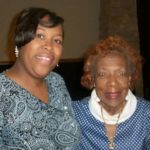 This Act Locally Waco blog post was written by Sophia A. Strother. Sophia is the CEO of Empowerment Driven by Knowledge Coalition & Trustworthy Consulting, a nonprofit community organization she founded. She has a master’s degree in marketing and is a licensed childcare administrator. Strother has endured much in her life—from sexual abuse and drug-addicted parents to being homeless and pregnant at 15. As an adult, Strother has struggled with and overcome her past demons and built a life and career around helping others. She shares her story in her book, “Sophia I’m Back” which is available online at Amazon.com and other channels.
This Act Locally Waco blog post was written by Sophia A. Strother. Sophia is the CEO of Empowerment Driven by Knowledge Coalition & Trustworthy Consulting, a nonprofit community organization she founded. She has a master’s degree in marketing and is a licensed childcare administrator. Strother has endured much in her life—from sexual abuse and drug-addicted parents to being homeless and pregnant at 15. As an adult, Strother has struggled with and overcome her past demons and built a life and career around helping others. She shares her story in her book, “Sophia I’m Back” which is available online at Amazon.com and other channels.
The Act Locally Waco blog publishes posts with a connection to these aspirations for Waco. If you are interested in writing for the Act Locally Waco Blog, please email [email protected] for more information.
(This post is one in a series on race titled “But Some of Us Are Brave.” The series includes posts from a diverse group of writers from our community. It takes a considerable amount of transparency and vulnerability for the contributors to this series to pen these posts and voice their experiences. We appreciate their courage, and we hope their willingness to be brave will spark some authentic community conversation on this sensitive and important topic. We hope you will read these posts thoughtfully and join the conversation by responding honestly and respectfully, and by sharing them with your friends and acquaintances. — ABT )
By Kelsey Miller
I want to recognize the great work Lucas did in his post in this series by echoing his confession: I am racist. We all are. I say this in a spirit of deep repentance, which is where any truthful conversation about race must begin. This beginning also protects us from the dangerous temptation to think that we will somehow transform our culture into a utopia where we will each transcend racism and become color-blind. Better instead to accept and find meaning in the challenge of the work of un-packing our own biases, conscious and subconscious. That is good and fruitful work that we might all dive into together for a lifetime.
I grew up outside Chicago in a very white, very privileged suburb. It was not until I moved to Texas that I first heard a blatantly racist comment, spoken by one white person to another. The naïve temptation in that moment was to believe that somehow, the more highly evolved North was devoid of racism, while the South is filled with it. With more exposure, I soon learned that racism is not a geographical problem or cultural problem; it’s a human problem. Still, in the last few years that I’ve lived in Texas, I am sobered by the number of times I can recall where I said nothing in reply to both explicitly and implicitly racist comments.
One tool that has helped me to analyze some of these comments and attitudes, and to continue questioning my own stereotypes and biases, is to read books and articles by African American authors who are critically engaging issues of race, power, and privilege in our culture. I am deep into Bryan Stevenson’s new book Just Mercy, and I believe his prophetic witness to the deep brokenness in our criminal justice system in the form of racial and socioeconomic disproportionality is changing me permanently.
Stevenson writes, “Today we have the highest rate of incarceration in the world. The prison population has increased from 300,000 people in the early 1970s to 2.3 million people today…One in every fifteen people born in the United States in 2001 is expected to go to jail or prison; one in every three black male babies born in this century is expected to be incarcerated.”
Stevenson goes on, “Some states permanently strip people with criminal convictions of the right to vote; as a result, in several Southern states disenfranchisement among African American men has reached levels unseen since before the Voting Rights Act of 1965.”
If you did not already know this, does it surprise you? I am shocked by the statistics and stories Stevenson shares in this book. Stories of systemized violence against people of color, of intentional legal misrepresentation of African American clients, of scores and scores of laws in our country that are less than 50 years dead that routinized and systemized the inferior status and treatment of people of color. I can own up to the fact that it is a privilege to be shocked, but I hope never to stop there. It is only when you and I use that shock to fuel us to keep reading, to keep listening, and to keep having the hard conversations that it becomes truly valuable.
Stevenson’s work has empowered me to engage more critically and respond more vocally to daily instances and examples of the dangerously disproportionate systems he unpacks. For white people, this means first confessing our own participation in racism, even if we think it only happens inside our own heads, and then resisting the urge to remain silent when other white people make openly or implicitly racist remarks. I used to think that it wasn’t worth risking a relationship or upsetting a temporary calm to call out wrong when I heard it. And I doubted my own strength, or that a few comments from me on the destructive nature of racism could be effective. How often do I tell myself that lie? That people can’t change or won’t understand, and it’s better for me to just be quiet?
Perhaps the more sobering question is this: is false harmony more valuable than the everyday pursuit of equality and justice?
A switch flipped when I realized that I can choose to either sell out people of color by refusing to openly condemn racism when I see it in action, or I can summon the courage to say something when it would be easier to be quiet. I’ll admit that this understanding of “bravery” is really lame and cheap in the wake of protestors who took to the streets of Selma, the bus boycotters who endured beatings and abuses, the unjustly tried and accused who faced all-white juries presented with zero evidence, followers of Dr. King and Malcolm X who were willing to give their all so that they might be heard, and so many more. Still, my voice is what I have, and speaking up is one thing I can do. So rather than be immobilized by the weight of my privilege and frustration, I can choose to say something. I can decide that false harmony is not more valuable than the everyday pursuit of equality and justice. I can risk the hurt feelings or shock of neighbors, colleagues, family, and friends when I tell them that comment they just made was NOT ok (and why).
And, since I started this post with a confession, I’ll end it with one: I am pretty terrible at being brave, most especially about a topic as challenging and uncomfortable as racism. But I’m trying, and I’m working on it, and I’m learning from people who are much braver and wiser than I am.
Will you join me? How can we be brave together today?
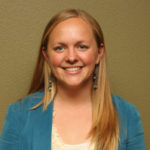 Kelsey Miller is a Child Hunger Outreach Specialist at Texas Hunger Initiative’s Waco Regional Office. She is passionate about more people gaining access to and education about healthy foods and our food system, and thinks the expertise of those experiencing hunger and poverty should always be our starting point. Kelsey lives with her husband and rambunctious puppy in Waco, and is also pursuing an MSW from Baylor part-time.
Kelsey Miller is a Child Hunger Outreach Specialist at Texas Hunger Initiative’s Waco Regional Office. She is passionate about more people gaining access to and education about healthy foods and our food system, and thinks the expertise of those experiencing hunger and poverty should always be our starting point. Kelsey lives with her husband and rambunctious puppy in Waco, and is also pursuing an MSW from Baylor part-time.
by Sara Perry
One year ago this February, I had a life-changing experience. The setting was the Austin Music Hall with 1200 women seated round long farm tables for two days. None of us could really articulate WHY we were there, and we had no idea what to expect. There was no published program or speaker list. But we all had an undeniable sense of something important about to happen.
Over those two days, we heard worship led by Christy Nockels, teaching from international women authors and speakers, like Christine Caine and Jen Hatmaker, and testimonies from ordinary women just like us. We were given beautiful gifts from ministries around the world. We engaged in the deepest level of life ponderings with women who were strangers until we all stepped into that magical place together. We were all very aware that a lot of women had wanted to be there that day who could not secure a ticket. But we were the lucky ones.
God started something that day that has grown like a thousand wildfires around the world. It was a sense of purpose, meaning, and desire to be present in our lives and our communities. It was a battle against the fear that permanently resided in each of our minds, telling us we were too insignificant to make a difference. It was an awakening to the power of women joining together, supporting each other, and living like God is real and heaven really is coming.
I am thrilled to say, Waco, the wildfire has spread to our town. And it is called IF.
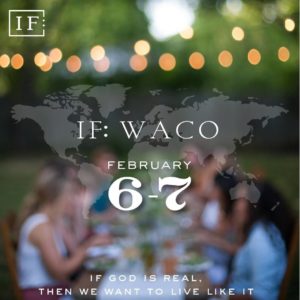 The main question the IF movement asks is: IF God is real, how can we live like we really believe it? The leaders of IF are working tirelessly to gather, equip, and unleash women across denomination, age, and background to live out their God-given purpose, wherever they are. For some of us, that is all about being the best mom, student, or friend we can be. For others, it may be taking a leadership role or meeting a local need in the community. There are endless possibilities and all roles are equally important. Haven’t each of us at some point thought, what IS my purpose?
The main question the IF movement asks is: IF God is real, how can we live like we really believe it? The leaders of IF are working tirelessly to gather, equip, and unleash women across denomination, age, and background to live out their God-given purpose, wherever they are. For some of us, that is all about being the best mom, student, or friend we can be. For others, it may be taking a leadership role or meeting a local need in the community. There are endless possibilities and all roles are equally important. Haven’t each of us at some point thought, what IS my purpose?
Whatever it looks like for each of us, it becomes a lot easier to embrace our role when we have support and encouragement from those around us.
So on February 6-7 we will come together. The theme is FAITH in God’s promises. We will hear teachings via simulcast from Austin. We will engage in worship and take time to reflect and discuss with each other. We will enter strangers and no doubt leave with at least one new supporter, encourager, and friend. And I am certain each woman will leave emboldened for living out her God-given purpose, whatever it may be at this season in her life.
I invite every woman in Waco to consider attending. Locally it is free to attend, and there are 3 locations – Baylor campus, Columbus Avenue Baptist, and Harris Creek Baptist. Or you can even watch it on your own in your own living room. Go to http://www.ifgathering.com for all the details. You can also join the IF:Gathering Waco group on Facebook to receive updates and to see clips from IF leaders and speakers.
My life changed for the better one year ago this February. I have heard countless testimonies of others who had a similar experience. Don’t miss this opportunity to see what God has in store for us as women unite across Waco and the world.
Here are the links to register:
- Baylor campus: ifwaco.com (or email [email protected])
- Columbus Avenue Baptist: http://www.cabcwaco.org/if-gathering
- Harris Creek Baptist: http://harriscreek.org/events/general/item/1271-if-gathering
 This Act Locally Waco blog post was written by Sara Perry. Sara is a teacher, mom, wife, sister, and child of God. Faith and yoga are her stress management prescriptions for anyone who asks. She is passionate about unleashing women from the fear and uncertainty that prevents them from living life to the fullest, and fulfilling the role God has for them. She lives with her two preschoolers, husband, and two senior citizen doxies in Waco. She attends Grace Church and is one of many IF:Local leaders passionate about uniting women across Waco.
This Act Locally Waco blog post was written by Sara Perry. Sara is a teacher, mom, wife, sister, and child of God. Faith and yoga are her stress management prescriptions for anyone who asks. She is passionate about unleashing women from the fear and uncertainty that prevents them from living life to the fullest, and fulfilling the role God has for them. She lives with her two preschoolers, husband, and two senior citizen doxies in Waco. She attends Grace Church and is one of many IF:Local leaders passionate about uniting women across Waco.
The Act Locally Waco blog publishes posts with a connection to these aspirations for Waco. If you are interested in writing for the Act Locally Waco Blog, please email [email protected] for more information.
by Sabrina Gray
I have fond memories of my brother and me growing up in Denver, Colorado, with my grandmother, Ruth. We could count on our grandmother being there for us. She was a religious woman, and also mystical. For example, she had a way of always showing up at school. We never knew the time or the hour, but we knew she would just appear.
I remember a time when I was at the front of my 5th grade English class, and I could hear some snickering from behind me. I turned around and there she was in her polyester dress, arthritis socks and nursing shoes, sitting in the back of the room, smiling and nodding her head. She didn’t care much about dressing up or appearances (unless it was church), but she did care about showing up at the school unannounced. I really worked on doing the right things in class because I never wanted the teacher to call her with a bad report. (My brother, on the other hand, did not share in the same sentiment!) Mrs. Ruth was most concerned about how her grandbabies were doing and progressing in school. I don’t remember much conversation about college, but we were encouraged to do our best and graduate from high school. Everyone in the school from the front office staff to the cafeteria workers knew my grandmother. Back then there weren’t many restrictions on allowing parents to come and check on their kids at school. Times have definitely changed, but the need for parent involvement hasn’t.
So what is a “parent?” How is “parenthood” currently defined? According to the free dictionary by Farlex a “parent” is a person who adopts a child, a person who raises a child, a guardian, a protector, a person who looks after and nurtures a child.
Traditionally, we think of parents as a mother and a father, but the new normal may be a blended family, a same sex family and/or an extended family. Whatever the case, we know that all kids need someone in their life to take a vested interest in them and their academic success. I believe that every child needs at least one person in their life that believes in them and advocates for their best interest. For me, that person was my grandmother.
It turns out that the research supports this belief. Decades of research show that when parents are involved students have:
- Higher grades, test scores, and graduation rates,
- Better school attendance,
- Increased motivation, better self-esteem,
- Lower rates of suspension,
- Decreased use of drugs and alcohol,
- And, fewer instances of violent behavior.
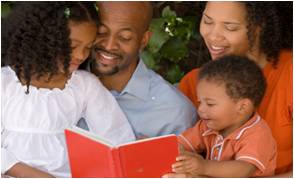 Parents, who read to their children, have books available, take trips, guide TV watching, and provide stimulating experiences contribute to student achievement. Family participation in education was twice as predictive of students’ academic success as family socioeconomic status. Some of the programs that called for more intensive parental involvement had effects that were 10 times more predictive of success.
Parents, who read to their children, have books available, take trips, guide TV watching, and provide stimulating experiences contribute to student achievement. Family participation in education was twice as predictive of students’ academic success as family socioeconomic status. Some of the programs that called for more intensive parental involvement had effects that were 10 times more predictive of success.
Without a doubt being an involved parent is important, but what does it mean to “be involved?” How do you do it? Do you have to magically make surprise classroom appearances in your arthritis socks? Well, that probably wouldn’t hurt, but here are some additional ideas:
- Start early – reading to your children before they can even understand the words helps to build lifelong positive associations with books and learning.
- Volunteer your time at your child’s school
- Join PTO or PTA
- Attend Parent training workshops and parent involvement conferences
- Show up for parent/teacher conferences throughout the school year
- Set positive examples for your child – let them see you reading, studying and learning
- Read to your child (this is worth repeating!)
- Check their homework
- Connect with your child’s school through any means available: email, text, blackboard messenger and social media for example
- Keep the lines of communication open with your child through frequent conversation. Even something as simple as consistently asking “How was school today?” or “How was your day today?” is important.
- Build a partnership with your child’s teachers. Remember…… there’s no “I” in team. It takes the parent(s) and the school working together to give your child the best possible chance to learn and thrive.
- Have fun and be flexible! Show your child that learning is something to seek after and enjoy…not something to put off or dread.
I’m personally grateful for my grandmother’s involvement in my upbringing and her ongoing encouragement for my brother and me to do our best. Getting involved has nothing to with your age, education, or your address. It has a lot to do with giving your child the best start in life that you can. Let’s remember it’s about our kids’ futures and improving their educational, emotional, social, and behavioral outcomes. Your involvement matters.
 This Act Locally Waco blog post was written by Sabrina Gray, current principal of Equal Opportunity Advancement Corp. (EOAC) -Waco Charter School. Sabrina graduated from Baylor University and completed her masters at Tarleton State University. She previously worked with WISD for over 21 years in many facets. Sabrina is married and has three adult children and one younger daughter in high school. Sabrina grew up with her grandmother in Denver, Colorado, and loves fishing, reading good mystery books and spending time with friends and family. If you would like to get in touch with Ms. Gray or learn more about the Waco Charter School, her email is [email protected].
This Act Locally Waco blog post was written by Sabrina Gray, current principal of Equal Opportunity Advancement Corp. (EOAC) -Waco Charter School. Sabrina graduated from Baylor University and completed her masters at Tarleton State University. She previously worked with WISD for over 21 years in many facets. Sabrina is married and has three adult children and one younger daughter in high school. Sabrina grew up with her grandmother in Denver, Colorado, and loves fishing, reading good mystery books and spending time with friends and family. If you would like to get in touch with Ms. Gray or learn more about the Waco Charter School, her email is [email protected].
The Act Locally Waco blog publishes posts with a connection to these aspirations for Waco. If you are interested in writing for the Act Locally Waco Blog, please email [email protected] for more information.
(This post is one in a series on race titled “But Some of Us Are Brave.” The series includes posts from a diverse group of writers from our community. It takes a considerable amount of transparency and vulnerability for the contributors to this series to pen these posts and voice their experiences. We appreciate their courage, and we hope their willingness to be brave will spark some authentic community conversation on this sensitive and important topic. We hope you will read these posts thoughtfully and join the conversation by responding honestly and respectfully, and by sharing them with your friends and acquaintances. — ABT )
A Bad Day – By Shamethia Webb
She was having a bad day.
And what exacerbated it was the fact that it wasn’t unusual.
She awoke on time (which meant early for her). Showered. Brushed her teeth. Scowled at herself in the mirror. And went to work.
All of her co-workers were talking about the black boy who was murdered while walking from a convenience store. They’d been talking about it for days. Talking about it and doing nothing. The same words again and again as if the incessant movement of their mouths negated a seventeen year old corpse.
She hated them.
During her break she washed and rewashed her hands in the restroom. She abhorred being in the ladies room for longer than a few minutes. It smelled like women. Which meant it smelled like pain and fatigue.
She wrenched a paper towel out of the dispenser and cast a frown at the vacant stalls that seemed to mock her loneliness.
She was tired.
She didn’t speak during staff meeting. Didn’t see the point in disturbing her tongue. They always smiled over her suggestions. Or tasted her words with their mouths before spitting them out. It infuriated her. Mostly it hollowed her. Cleaved into her like a perforated knife and emptied her out.
She’d spilled so much of herself over these hallways during her tenure here. Specks of herself all over the walls. Now a permanent grimace clung to her face like love.
The smell of coffee hung in the air. Stale. A room full of spit and disdain. She inhaled. Yes, disdain. She could smell it on them like second skin.
They were talking about him again. Her boss didn’t use the word murder. But defense. And mistake. And misunderstanding.
She hated him.
Her co-worker, the one with a frown for a smile, giggled at her boss’s comment that the black boy should have ducked the bullets.
I thought black boys were fast, he joked. A room full of laughter.
She died a little bit.
But not enough. She still had to clock out. And smile at the receptionist who always mispronounced her name. She still had to leave the building—and them, and them—with as much of herself intact as possible.
She stumbled to her car, trembling in her black woman fury.
She was tired.
In the checkout line at the supermarket, she watched as her few items moved lazily up the conveyor belt. The cashier chatted animatedly with the customer in front of her.
Don’t let this cashier cut her eyes at me, she thought to herself. Not today.
Don’t let her reach for my money with two fingers as if she’s afraid of skin contact. Don’t let her suddenly become mute and unresponsive to my presence, to my human being-ness. Don’t let her. Not today.
She realized with some panic that it wasn’t anger that fueled her thoughts but despair. She recognized that if the cashier did de-humanize her today she wouldn’t respond with fury but with resignation.
The passivity worried her.
I’m dying too fast, she thought.
She tensed as her items moved closer to the cashier, and she couldn’t help but notice that the murdered boy’s eyes stared back from every magazine in the aisle.
The repetition overwhelmed her. She shook.
Pieces of herself broke off. Landed dully on the laminate floor.
She tried to remember her breath. And forget her boss and the restroom stalls and the hundreds of cashiers who’d humiliated her and the tiptoeing gunman and the black corpse and the black corpses theblackcorpsestheblackcorpsestheblackcorpsetheblacktheblacktheblackblackblack
She tried to catch herself but her hands were already gone. Dead.
. . .
I hate soap operas.
A voice behind her.
She opened her eyes. When had she closed them?
A white man behind her scowled at a TV guide featuring frozen celebrities. He turned a full smile on her. The white of his teeth blinding for a moment.
Don’t you just hate soap operas?
She managed a nod.
She did hate them. This aisle was full of things she hated. This city. This world. Full of things she hated. Or perhaps just full of things (No. People, she amended. She liked being correct). Full of people who hated her.
I’d rather read the back of a cereal box than watch TV, the man said.
He picked up one of his boxes of cereal and waved it at her.
This isn’t food but entertainment.
She smiled. Not a full one (she was incapable of that at this point) but a slash of the mouth that surprised her with its suddenness.
. . .
And there was a pocket of time when he wasn’t who he was or had to be and she wasn’t who she was or had to be. They just were.
And there was a glimmer inside of her. Something not quite dead, that stirred.
The cashier was aloof but polite. And that was enough.
She walked to her car without the usual trembling.
The white man (No, man, she corrected) was parked beside her. They chatted as they loaded their items into their cars.
Well, he chatted. She managed to listen without the usual weariness and rage.
Perhaps she would sleep in tomorrow.
Yes.
Perhaps she would grow again.
And as she slid into her driver’s seat, a murmur of a smile across her face, the man waved a crumbled bill in her face and propositioned her for sex.
 Shamethia Webb (on the right in the picture) is the Regional Director of the Texas Hunger Initiative Waco Regional Office. She grew up in Waco and spends her free time writing, dreaming, and trying to protect her reign as Connect Four Champion from her nephews. Hip hop music, sour candy, and Toni Morrison novels are a few of her favorite things.
Shamethia Webb (on the right in the picture) is the Regional Director of the Texas Hunger Initiative Waco Regional Office. She grew up in Waco and spends her free time writing, dreaming, and trying to protect her reign as Connect Four Champion from her nephews. Hip hop music, sour candy, and Toni Morrison novels are a few of her favorite things.
by Andy Hogue and Ross Tarpley
In October 2013, I (Andy) sat outside Common Grounds one splendid fall morning with Lauren Wolter, the director of a new program called The Philanthropy Lab. Based in Fort Worth, The Philanthropy Lab was working with Harvard, Yale, Stanford, and a few other elite universities to do something innovative: to help students learn about philanthropy while they do philanthropy, to enable students to understand the social sector even as they contribute to it. Ms. Wolter met me in Waco to ask if Baylor might wish to apply to partner with them.
As she explained the program over coffee, I was spellbound; it was a fascinating concept. The idea belonged to Geoffrey Raynor, the founding partner of Fort Worth-based Q Investments, who ventured, as those in his profession are wont to do, on something promising but risky. A thoughtful and seasoned giver himself, Mr. Raynor wondered if our culture might bend toward generosity if the country’s brightest young minds were afforded the chance to learn the skills of thoughtful giving—to research and understand public concerns, to assess the organizations daring to address those concerns, and to project the potential impact of philanthropic gifts, monetary and otherwise. All of this might be especially meaningful, Mr. Raynor ventured, if students could work with real money. And so, guided by his visionary leadership and innovative generosity, The Philanthropy Lab launched at the country’s top schools.
Ms. Wolter explained in our meeting that the program looked different at every university. Some housed it in economics, some in education or public policy. Some closely scripted the giving process, while others left it wide open for the students to shape. Most gave globally; some gave locally. To apply, we at Baylor were to propose in detail our own philanthropy course and our own process for giving. What would we aim to do, and how? In partnership with my colleague, Dr. Wes Null, we began to sketch it out.
The Idea
Our choices, technically, were unlimited, though one thing felt clear: Baylor and Waco both depend on one another to flourish, and our philanthropy program ought to reflect that. What about a unique process forged with that in mind: one that was purely local, built on durable, lasting, meaningful partnerships with the city’s nonprofit organizations; one that presented shared value to our students and our community, with local civic and nonprofit leaders giving knowledge and imagination and inspiration to our students, and our students in turn giving imagination, inspiration, and financial gifts back to our nonprofits; one that could afford collaboration between our best young minds and our best less-young minds to enrich life in our fair city? These were our hopes. This was our proposal. And lo and behold, they accepted it, granting us $100,000 to use in the first semester of the course (with more semesters still to come).
Buoyed by The Philanthropy Lab’s approval, we recruited thirty of Baylor’s best students from across disciplines and entered into a hopeful partnership with about 70 local nonprofit organizations. The terms were simply that these diverse organizations would open their doors, pitch ideas, lend expertise, and inspire imagination in our students about how, effectively, they might enrich the community with dollars and skills. In return, they became eligible for grant funding dependent upon the students’ selection at the end of a lengthy due diligence process.
The Process
On the first day of class it became clear to me that I (Ross) was surrounded by other students with different majors, different backgrounds and experiences, different passions and desires, but who were all interested in working toward good. As Baylor students driven by strivings for Christ in us and around us, this became an opportunity not only to understand philanthropy but also to practice it intentionally, a chance to serve and love our neighbors in Waco while experiencing the transformative power of giving.
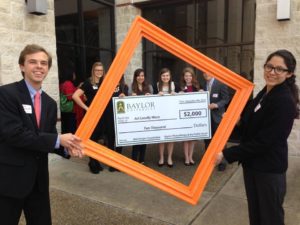 Five teams of six members were assigned a specific “subsector” of Waco nonprofits, from Health & Human Wellness; to Education & Mentoring; to Culture, Arts, & the Environment, among others. We quickly learned the participating organizations were only a small fraction of Waco’s several hundred local nonprofits—an encouraging realization that while our town does have a lot of need, there are lots of hearts and hands at work to alleviate it. The remainder of our process involved weeks of research, interviews, guidance from executive directors of local Waco foundations, and the painstaking selection of the final recipients of our grants—a task that was unsurprisingly difficult when there are so many good things aimed at enriching our community and meeting its needs.
Five teams of six members were assigned a specific “subsector” of Waco nonprofits, from Health & Human Wellness; to Education & Mentoring; to Culture, Arts, & the Environment, among others. We quickly learned the participating organizations were only a small fraction of Waco’s several hundred local nonprofits—an encouraging realization that while our town does have a lot of need, there are lots of hearts and hands at work to alleviate it. The remainder of our process involved weeks of research, interviews, guidance from executive directors of local Waco foundations, and the painstaking selection of the final recipients of our grants—a task that was unsurprisingly difficult when there are so many good things aimed at enriching our community and meeting its needs.
The (Transferable) Lessons
Our work and our learning over the course of the semester presented us with a startling realization: higher education is full of opportunities to learn about how to make money, how to handle it, how to get ahead and make one’s way in the world. But there is surprisingly little about how to give—not just of one’s money or in one’s profession, which are important, but also of one’s very self, which is more important.
Giving is complex, and there are many ways to do it. But as Richard Gunderman describes it, “the ultimate goal of philanthropy is not to reduce, prevent, or eliminate need. The ultimate goal of philanthropy is to promote sharing.” And this is an important takeaway—that one of the greatest gifts any human being could ever share with us, or any of us could share with another, is assistance in becoming the best persons, families, institutions, and communities we are capable of being.
Our financial gifts did not eliminate need or “fix” our community’s biggest concerns. They couldn’t, and no amount of financial giving could. The profound lesson is that we all can share of ourselves toward those ends, and when we share of ourselves, at least two things happen: 1) we express our belief in someone else, which promotes hope; 2) we can invite someone to share back with us, which promotes community. Any place marked by hope and community is a place, we’re convinced, with great potential for human flourishing. –– AH/RT
Whether you’re new to this journey or far on down the way, here are a few very quick aids to challenge your thinking and enhance your giving.
Web tools:
- Bridgespan’s guide to getting started
- What Are We Talking About When We Talk About Impact? (from UPenn’s Center for High Impact Philanthropy)
Books:
- Richard Gunderman, We Make a Life By What We Give
- Robert Payton & Michael Moody, Understanding Philanthropy: Its Meaning and Mission
A good Ted Talk:
- Kat Rosqueta, “Amplify the Money You Give”
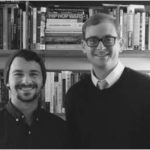 This Act Locally Waco blog post was written by Andy Hogue and Ross Tarpley. Andy has lived with his family in North Waco (with a brief excursion to the Pacific Northwest) since 2003. He is married to Tiffany, an attorney and Baylor administrator, and they have two girls, Anna (8) and Caroline (4). At Baylor Andy teaches courses on philanthropy, civic engagement, and a range of topics in American politics, particularly its intersections with religion and race. Ross, originally from Marshall, TX, is a senior Baylor Business Fellows major, studying Entrepreneurship and Religion. He loves singing, being at church, and healthy theological discussions. Upon graduation, Ross has no idea what he will do with his life, but options range from seminary, to teaching, to auditioning for a professional singing group.
This Act Locally Waco blog post was written by Andy Hogue and Ross Tarpley. Andy has lived with his family in North Waco (with a brief excursion to the Pacific Northwest) since 2003. He is married to Tiffany, an attorney and Baylor administrator, and they have two girls, Anna (8) and Caroline (4). At Baylor Andy teaches courses on philanthropy, civic engagement, and a range of topics in American politics, particularly its intersections with religion and race. Ross, originally from Marshall, TX, is a senior Baylor Business Fellows major, studying Entrepreneurship and Religion. He loves singing, being at church, and healthy theological discussions. Upon graduation, Ross has no idea what he will do with his life, but options range from seminary, to teaching, to auditioning for a professional singing group.
The Act Locally Waco blog publishes posts with a connection to these aspirations for Waco. If you are interested in writing for the Act Locally Waco Blog, please email [email protected] for more information.
(This post is one in a series on race titled “But Some of Us Are Brave.” The series includes posts from a diverse group of writers from our community. It takes a considerable amount of transparency and vulnerability for the contributors to this series to pen these posts and voice their experiences. We appreciate their courage, and we hope their willingness to be brave will spark some authentic community conversation on this sensitive and important topic. We hope you will read these posts thoughtfully and join the conversation by responding honestly and respectfully, and by sharing them with your friends and acquaintances. — ABT )
I just want to say one thing. It’s very simple and I’m not supposed to say it. I am racist. Most of the time I don’t know I’m racist and I don’t mean to be racist, but I am. I wouldn’t know much about my own racism if it weren’t for friends of color leading me and teaching me. Friends like Pastor Delvin Atchison of Antioch Baptist Church in Waco. Like my friend Luis and like my friend DeShauna.
You see, White people, like myself, need our brothers and sisters of color to teach us about racism. We are blinded to so many things by our power and our privilege. We don’t think about race every day because we don’t have to, but our brothers and sisters don’t have a choice. They understand race and racism in a way that I never can, because for them it is a lived experience, a daily struggle.
If we hope to overcome our racism and find peace and justice in cities like Ferguson, then White people must begin by confessing. We are racist. I am racist. Racism is real.
In the civil rights movement, people like Martin Luther King, Jr., Fannie Lou Hamer, Rosa Parks, Septima Clark and many more brave, unnamed souls stood up against the racist laws and treatment they received in the South. They stood together, but they were in one sense alone. They stood up without the support of their White brothers and sisters, without those who held the seats of power. They stood on their own to demand their rights and demand justice. However, it wasn’t until White people stood in solidarity with African-Americans that the nation took notice. The images of firehoses and dogs being turned on peaceful protestors galvanized White Americans to go to the South and stand with their brothers and sisters for their rights and for justice. Then when a White minister from the north was killed there was a national outcry that helped pass the Voting Rights Act of 1965. It’s not right that the death of one White man mattered more than all the deaths of Black people that came before it, but it was a reality of life in those times that the solidarity of White people with the civil rights movement helped changes to the system come about more quickly.
The hashtag and slogan #blacklivesmatter that has emerged from the experience and protests in Ferguson and elsewhere reflects the fact that the reality of life during the civil rights era continues today. We have come so far and yet still have so far to go. I do think passing laws and regulations for police officers related to racial profiling, excessive force and other issues can have a huge impact on the treatment of people of color. It is an important step, like the Civil Rights Act and Voting Rights Act. Yet no law or regulation will remove racism and prejudice from the hearts of human beings.
This is why the movement needs the confession of White people willing to stand with African-Americans and acknowledge our own complicity in the racism and systems that continue the legacies of slavery, colonization and White oppression. Without that solidarity those in power will continue to enforce the status quo and ignore the destructiveness of the systems that perpetuate racism. The hashtag reminds us that we White people must confess that White lives still matter more than Black lives.
Now, don’t get me wrong. I’m not saying that the Black community needs a White savior to ride in and solve its problems. That “White savior” complex has caused more harm than good since the Voting Rights Act was passed. As people of privilege and power from the dominant culture, we White people must be careful that our solidarity and activism begins with confession and a lot of listening. When we speak truth to power it must come from an intimate understanding and relationship with those who face the struggle against racism and oppression every day. So please stand with our brothers and sisters of color by admitting and confessing that we are racist, that we don’t know or understand our own racism and that we need our brothers and sisters of color to teach us and lead us forward if we hope to find any peace and justice.
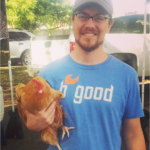 Lucas Land is an eco-theologian, urban farmer, writer and activist. He is avoiding growing up by constantly learning and trying new things. He is currently working toward a certificate in permaculture design. He was Urban Gardening Intern at World Hunger Relief, Inc. He worked on water and agriculture issues in Bolivia with Mennonite Central Committee. He also founded the sustainable landscaping business Edible Lawns here in Waco. He lives with his wife, three children and flock of chickens in the Sanger Heights Neighborhood in North Waco.
Lucas Land is an eco-theologian, urban farmer, writer and activist. He is avoiding growing up by constantly learning and trying new things. He is currently working toward a certificate in permaculture design. He was Urban Gardening Intern at World Hunger Relief, Inc. He worked on water and agriculture issues in Bolivia with Mennonite Central Committee. He also founded the sustainable landscaping business Edible Lawns here in Waco. He lives with his wife, three children and flock of chickens in the Sanger Heights Neighborhood in North Waco.
This article was originally published on Lucas’ blog, What Would Jesus Eat?, http://www.lucasmland.com/2014/12/01/solidarity-with-ferguson-i-am-racist/
